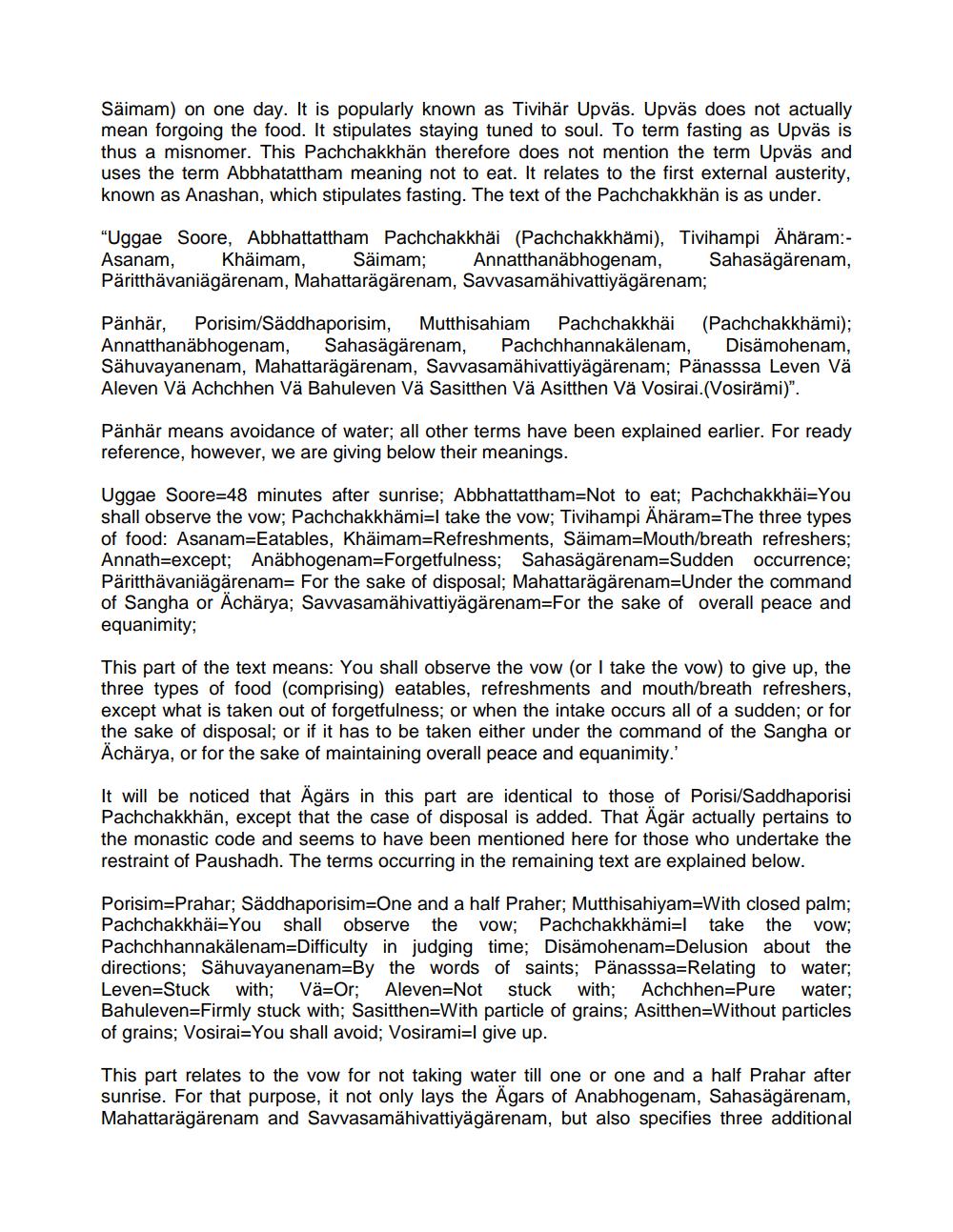________________
Säimam) on one day. It is popularly known as Tivihär Upväs. Upväs does not actually mean forgoing the food. It stipulates staying tuned to soul. To term fasting as Upväs is thus a misnomer. This Pachchakkhän therefore does not mention the term Upväs and uses the term Abbhatattham meaning not to eat. It relates to the first external austerity, known as Anashan, which stipulates fasting. The text of the Pachchakkhän is as under.
"Uggae Soore, Abbhattattham Pachchakkhai (Pachchakkhämi), Tivihampi Ähäram:Asanam, Khaimam, Sǎimam; Annatthanäbhogenam, Sahasägärenam, Päritthävaniägärenam, Mahattarägärenam, Savvasamähivattiyägärenam;
Pänhär, Porisim/Säddhaporisim, Mutthisahiam Pachchakkhäi (Pachchakkhämi); Annatthanäbhogenam, Sahasägärenam, Pachchhannakälenam, Disämohenam, Sähuvayanenam, Mahattarägärenam, Savvasamähivattiyägärenam; Panasssa Leven Vä Aleven Vā Achchhen Vä Bahuleven Vä Sasitthen Vä Asitthen Vä Vosirai.(Vosirämi)".
Pänhär means avoidance of water; all other terms have been explained earlier. For ready reference, however, we are giving below their meanings.
Uggae Soore=48 minutes after sunrise; Abbhattattham=Not to eat; Pachchakkhäi=You shall observe the vow; Pachchakkhämi-l take the vow; Tivihampi Ähäram=The three types of food: Asanam-Eatables, Khäimam-Refreshments, Saimam-Mouth/breath refreshers; Annath-except; Anäbhogenam-Forgetfulness; Sahasägärenam-Sudden occurrence; Päritthävaniägärenam For the sake of disposal; Mahattarägärenam-Under the command of Sangha or Acharya; Savvasamähivattiyägärenam-For the sake of overall peace and equanimity;
This part of the text means: You shall observe the vow (or I take the vow) to give up, the three types of food (comprising) eatables, refreshments and mouth/breath refreshers, except what is taken out of forgetfulness; or when the intake occurs all of a sudden; or for the sake of disposal; or if it has to be taken either under the command of the Sangha or Acharya, or for the sake of maintaining overall peace and equanimity."
It will be noticed that Ägärs in this part are identical to those of Porisi/Saddhaporisi Pachchakkhän, except that the case of disposal is added. That Ägär actually pertains to the monastic code and seems to have been mentioned here for those who undertake the restraint of Paushadh. The terms occurring in the remaining text are explained below.
Porisim Prahar; Säddhaporisim One and a half Praher; Mutthisahiyam-With closed palm; Pachchakkhäi=You shall observe the vow; Pachchakkhämi=l take the vow; Pachchhannakälenam-Difficulty in judging time; Disämohenam-Delusion about the directions; Sähuvayanenam-By the words of saints; Panasssa-Relating to water; Leven-Stuck with; Vä Or; Aleven Not stuck with; Achchhen-Pure water; Bahuleven-Firmly stuck with; Sasitthen-With particle of grains; Asitthen-Without particles of grains; Vosirai=You shall avoid; Vosirami-l give up.
This part relates to the vow for not taking water till one or one and a half Prahar after sunrise. For that purpose, it not only lays the Ägars of Anabhogenam, Sahasägärenam, Mahattarägärenam and Savvasamähivattiyägärenam, but also specifies three additional




